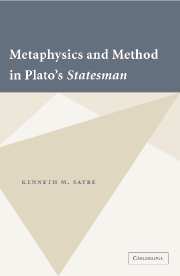Book contents
- Frontmatter
- Contents
- Acknowledgments
- Introduction
- PART I METHOD
- 1 Becoming Better Dialecticians
- 2 Collection in the Phaedrus and the Sophist
- 3 Division in the Phaedrus and the Sophist
- 4 Collection Yields to Illustrative Paradigms
- 5 The Weaver Paradigm
- 6 The Final Definition
- PART II METAPHYSICS
- Appendix: Equivalents for the Great and the Small in Aristotle and His Commentators
- Bibliography
- Index Locorum
- Index of Names
- General Index
1 - Becoming Better Dialecticians
Published online by Cambridge University Press: 23 November 2009
- Frontmatter
- Contents
- Acknowledgments
- Introduction
- PART I METHOD
- 1 Becoming Better Dialecticians
- 2 Collection in the Phaedrus and the Sophist
- 3 Division in the Phaedrus and the Sophist
- 4 Collection Yields to Illustrative Paradigms
- 5 The Weaver Paradigm
- 6 The Final Definition
- PART II METAPHYSICS
- Appendix: Equivalents for the Great and the Small in Aristotle and His Commentators
- Bibliography
- Index Locorum
- Index of Names
- General Index
Summary
Topical Structure of the Dialogue
The Statesman begins with Socrates thanking Theodorus for introducing him to Theaetetus and the Stranger (ξένος) from Elea. After a bantering interchange on the relative values of sophistry, statesmanship, and philosophy, and after acquiescing to the Stranger's request that Young Socrates (YS) serve as respondent in the ensuing discussion, Socrates announces his intention to converse with his younger namesake on another occasion and takes his seat among the audience. We hear nothing more from him until the final speech of the dialogue in which he compliments the Stranger for completing an excellent portrayal of the kingly art.
The Stranger begins by assuming that the statesman, like the sophist before him, is someone possessing knowledge (έπιστημόνων: 258B4). After securing YS's agreement that the king, the slave master, and the household manager all share the same knowledge and exercise the same skill as the statesman (259C1–4), the Stranger identifies this knowledge as theoretical (γνωστικῆς: 259C10) rather than practical (πρακτικῆς: 259D1). Theoretical knowledge is then divided into that responsible for making judgments and that responsible for giving directions, which latter is further divided into self-directive (αὐτεπιτακτικην) and a nameless kind concerned with promulgating the directions of others. Those guided by their own directions, in turn, might be concerned with bringing either inanimate or animate products into being (γενέσεσιν at 261B13).
- Type
- Chapter
- Information
- Metaphysics and Method in Plato's Statesman , pp. 11 - 35Publisher: Cambridge University PressPrint publication year: 2006

